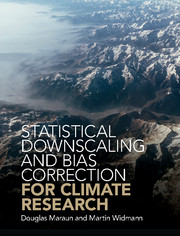
- Publisher:
- Cambridge University Press
- Online publication date:
- December 2017
- Print publication year:
- 2018
- Online ISBN:
- 9781107588783

Statistical downscaling and bias correction are becoming standard tools in climate impact studies. This book provides a comprehensive reference to widely-used approaches, and additionally covers the relevant user context and technical background, as well as a synthesis and guidelines for practitioners. It presents the main approaches including statistical downscaling, bias correction and weather generators, along with their underlying assumptions, skill and limitations. Relevant background information on user needs and observational and climate model uncertainties is complemented by concise introductions to the most important concepts in statistical and dynamical modelling. A substantial part is dedicated to the evaluation of regional climate projections and their value in different user contexts. Detailed guidelines for the application of downscaling and the use of downscaled information in practice complete the volume. Its modular approach makes the book accessible for developers and practitioners, graduate students and experienced researchers, as well as impact modellers and decision makers.
Winner, 2019 PROSE Award for Environmental Science
‘This book provides an invaluable reference for anyone involved in developing or using local and regional projections to quantify climate change impacts. As climate model output becomes increasingly accessible and open source code for downscaling is shared by the research community, the selection of methods and data to use for a local climate impacts analysis becomes more complex. This reference provides comprehensive guidance for those developing improved downscaling approaches, applying existing methods, or using data generated by others. The authors keep a clear focus on quantifying the uncertainties involved in each step of a downscaling process, and highlighting opportunities to ultimately produce more skilful information for decision-makers challenged with responding to climate change impacts.’
Ed Maurer - Santa Clara University, California
‘A large variety of statistical downscaling and bias correction methods are used for connecting climate change with impact assessments. The new book by D. Maraun and M. Widmann provides a very useful overview of the methods and topics involved and gives guidance for future users. The demand for downscaled information is rapidly growing and this book helps with understanding assets and drawbacks.’
Daniela Jacob - Climate Service Center Germany (GERICS), Hamburg
 Loading metrics...
Loading metrics...
* Views captured on Cambridge Core between #date#. This data will be updated every 24 hours.
Usage data cannot currently be displayed.
Accessibility compliance for the PDF of this book is currently unknown and may be updated in the future.